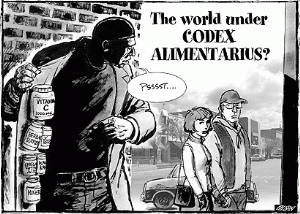This is Part Two of a continuing series on Codex Alimentarius and its potential impact on the natural health industry in non-European countries. Click here for Part One. In the United States, the European Food Supplements Directive and Codex would appear to be completely irrelevant largely due to massive efforts that led to the passage of the Dietary Supplements Health and Education Act (DSHEA) of 1994. In fact, Codex is barely even on the radar as a real threat to the natural health industry in the U.S. DSHEA is perceived to be an unbreakable steel barrier to Codex or Europe's legislative influence or any other "foreign" attempt to breach America's "safe haven" status for the natural health and nutritional innovative industries. The consensus within the U.S. natural health industry is that it will continue to enjoy unfettered access to the full array of innovative products and high-dose supplementation. This view continues to be promoted by the very associations that are actually paid by its members to protect industry, practitioner, and consumer interests.
There is no argument that the passage of the Dietary Supplement Health and Education Act in the United States was perhaps the single most important legislative development in the history of health freedom. Since 1994, interest in supplements, traditional medicines, alternative therapies and the natural health industry as a whole has grown dramatically in the United States. So much so that it is now estimated that more than 40 percent of the entire U.S. population take dietary supplements on a regular basis and as much as 70 percent use them periodically.
So, are the United States and other non-European nations sufficiently protected against the already approved European anti-vitamin legislation and Codex's mandate to fully incorporate them as international "Standards?"
A number of the unbiased experts and Health Freedom Campaign organizations wholeheartedly agree – they are NOT! What is the truth? Unfortunately, sorting out the true relevance and potential threat can be a somewhat daunting and complicated process. Some definite effort on the reader's part is required in order to bring together, review, and personally inspect the truly relevant information. To separate these out from the tiring and relentless "alarm bells, conflicting media coverage, well funded public relations efforts, and misleading and sometimes completely false opinions and interpretations, let's review some key elements.
First of all, one of the main reasons confusion continues to exist is that Codex's actual relevance to the United States stems not from Codex's own documents, which in the main appear simply to promote health and nutritional "guidelines and standards" that each nation should aspire to, but from actual and legal obligations contained within a number of international trade agreements already signed by the governments of numerous countries outside of Europe, including the U.S.
These include the General Agreement on Tariffs and Trade (GATT), which was signed in 1947, and more recently, the World Trade Organization (WTO) agreement signed during President Clinton's administration in 1995, updating and virtually replacing the original GATT agreement. In fact, it appears the legal basis for enforcement of the various "Guidelines" and "Standards" created by Codex will come from the 'Agreement on the Application of Sanitary and Phytosanitary Measures,' known as the "SPS Agreement" and the 'Agreement on Technical Barriers to Trade' known as the "TBT" Agreement. Both the SPS and TBT agreements were included among the Multilateral Agreements on Trade in Goods, which was annexed to the agreement that originally established the WTO.
A lot of legal gibberish? We couldn't agree more, but unfortunately, quite dangerous to the natural health industry, as the following pages may make clear.
Stay tuned for Part Three: European Influence on Codex.





